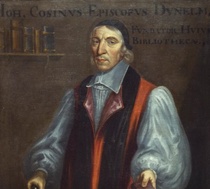Intelligent, demanding, and meticulous: getting to know Bishop John Cosin

Over the last year, History PhD student Lily Chadwick has been cataloguing the correspondence of Bishop John Cosin, founder of Cosin’s Library on Palace Green in the centre of Durham. Reading through his letters, she caught a glimpse of his personality.
Cataloguing the correspondence of Bishop John Cosin over the course of the last eight months has provided considerable insight into the personality and mind of one of Durham’s most imposing figures. Certainly, there are limitations to the source material, which mean that we cannot draw definitive conclusions about Cosin as a person.
For instance, many of the catalogued letters include only one side of the dialogue, either that of Cosin or one of his many agents, meaning much of the narrative must be inferred from references within the letters. Nevertheless, a great deal of Cosin’s personality can be gleaned from his extant letters. For instance, Cosin seemingly had a tendency to micromanage his staff, especially in regard to the management of his various estates and properties. Cosin’s expectations were evidently quite high, and his desire to know all the ins and outs of his affairs feature prominently in his letters. Cosin wrote to his secretary, Miles Stapylton, in November 1671, asserting:

I have received yours of the 4th instant. Your excuse for not writing by the post before I cannot approve: for there are so many occurrences every day happening upon some affaires of mine or other that you can want no materialls for a letter every post
John Cosin to Myles Staplyton, 7 November 1671, DUL Cosin Letter Book 4B, 172
Nor was Cosin afraid to express his displeasure when the content of the post did not meet his standards:

I confess it troubles me when upon every occasion or affaire of mine wherein you are employd, you answer me with your uncertaintyes and your I cannot tell which leaves me to fears & conjectures & nothing els.
John Cosin to Myles Stapylton, 25 April 1671,DUL Cosin Letter Book 4B, 155
Indeed, upon analysis of his letters, one is left with little doubt that Cosin ran a tight ship. And yet, his scrupulous and exacting manner in relation to business is juxtaposed by little moments of tenderness and vulnerability, moments that are especially apparent during bouts of illness towards the end of his life. In a letter to Stapylton on 9 December 1671, for example, Cosin writes:

I pray both of you to continue the care that you have hitherto taken of my private booke, besides all other matters that may concerne me & for which I can rely upon no others but you, nor would be willing that any other strangers to me should be acquainted or take notice what moneys I have or how my reckonings goe.John Cosin to Myles Stapylton, 9 December 1671,DUL Cosin Letter Book 4B, 174
Although this concerns the management of his accounts, Cosin in this passage expresses a rare moment of vulnerability in which he acknowledges, in his way, his dependency upon Stapylton to order Cosin’s affairs in a discrete and private manner. This has necessitated an intimate connection between Cosin and Stapylton, one which Cosin was not willing to exchange with another. Even so, Cosin died, just over a month after this letter had been written, on 15 January 1672. Perhaps he was aware of his impending mortality and felt keenly his attachment to those in his service. Or perhaps he simply wished to emphasise pragmatically his reliance upon those around him in his time of illness. Unfortunately, we can only speculate as to the extent of Cosin’s emotional range. But we can certainly begin to understand different facets of Cosin’s personality: intelligent, demanding, and meticulous, while at the same time dependent and even vulnerable.
This post has also been published on Durham University’s Library and Collections blog
Get to know John Cosin for yourself
Cosin’s correspondence has been catalogued and digitised, so you can have a read of the letters yourself. Struggling with his handwriting? We are currently running a volunteer project to transcribe a selection of letters and will be launching a palaeography module soon!
